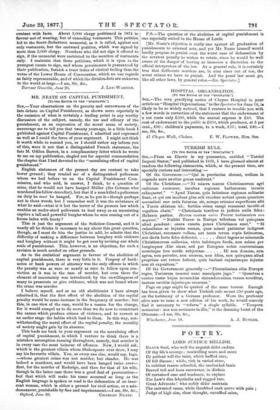MR. NEATE ON CAPITAL PUNISHMENT. cro THE EDITOR OF THE
" SPZOTAVOR."1
Sin,—Your observations on the poverty and narrowness of the late debate on Capital Punishment, as shown more especially in the omission of what is certainly a leading point in any worthy discussion of the subject, namely, the use and efficacy of the punishment, as an expression of the moral sense of society, encourage me to tell you that twenty years ago, in a little book I published against Capital Punishment, I admitted and expressed AS well as I could the force of your argument. I might not think it worth while to remind you, or I should rather say inform you of this, were it not that a distinguished French statesman, the late M. Odilon Barrot, in a complimentary letter which he wrote to me on my publication, singled out for especial commendation the chapter that I had devoted to the "moralising effect of capital punishment."
English statesmen of the present day are content to take lower ground ; they remind me of a distinguished policeman whom we had before us on the Capital Punishment Com- mission, and who said, in answer, I think, to a question of mine, that he would not have hanged Muller (the German who murdered his fellow-traveller), but that if a man killed a policeman on duty he must be hanged, For, as be put it—though perhaps not in these words, but I remember well it was the substance of what he said—what is it but the terror of the present law which enables an under-sized policeman to lead away as an unresisting captive a tall and powerful burglar whom he sees coming out of a house laden with booty?
This is just the argument of the Solicitor-General, and it is nearly all he thinks it necessary to say about this great question, though, as I must do him the justice to add, he admits that the difficulty of making a difference between burglary with violence and burglary without it might be got over by revising our whole scale of punishment. This, however, is no objection, for such a revision is much needed on other grounds.
As to the statistical argument in favour of the abolition of capital punishment, there is very little in it. Forgery of bank- notes or bank powers of attorney was the only offence in which the penalty was as sure or nearly as sure to follow upon con- viction as it was in the case of murder, but even there the element of uncertainty was introduced, by the unwillingness of many to prosecute or give evidence, which was not found where the crime was murder.
I believe myself, and as an old abolitionist I have always admitted it, that the first effect of the abolition of the capital penalty would be some increase in the frequency of murder; but this, in one view of the case, would be a reason for the change, for it would compel us to do more than we do now to counteract the causes which produce crimes of violence, and to correct at an earlier stage the habits which lead to them. In this way, not- withstanding the moral effect of the capital penalty, the morality of society might gain by its absence.
This leads me back to your argument on the moralising effect of capital punishment, in which I venture to think there is a mistaken assumption running throughout, namely, that murder is in every case the most heinous of offences. Now, I would ask, which is the greatest villain whom Shakespeare ever drew, I may say his favourite villain. You, as every one else, would say, Iago, —whose greatest crime was not murder, but slander. He was indeed a murderer, and would have been hanged twice over— first, for the murder of Roderigo, and then for that of his wife, though in the latter case there was a good deal of provocation— but' that which will make his name accursed so long as the English language is spoken or read is the defamation of an inno- cent woman, which is either a ground for civil action, or a mis- demeanour, punishable by fine and imprisonment.—I am, Sir, &c., P.S.—The question of the abolition of capital punishment is one especially suited to the House of Lords.
[Mr. Neate's objection is really one against all graduation of punishments to external acts, and yet Mr. Neate himself would hardly propose to punish even the worst case of defamation by the severest penalty he wishes to retain, since he would be well aware of the danger of leaving so immense a discretion to the official interpreters of the law. As a general rule, it is certainly true that deliberate murders are, in nine cases out of ten, the worst crimes we have to punish. And the penal law must go, like all other laws, by general rules.—En. Spectator.]


































 Previous page
Previous page